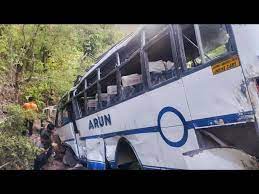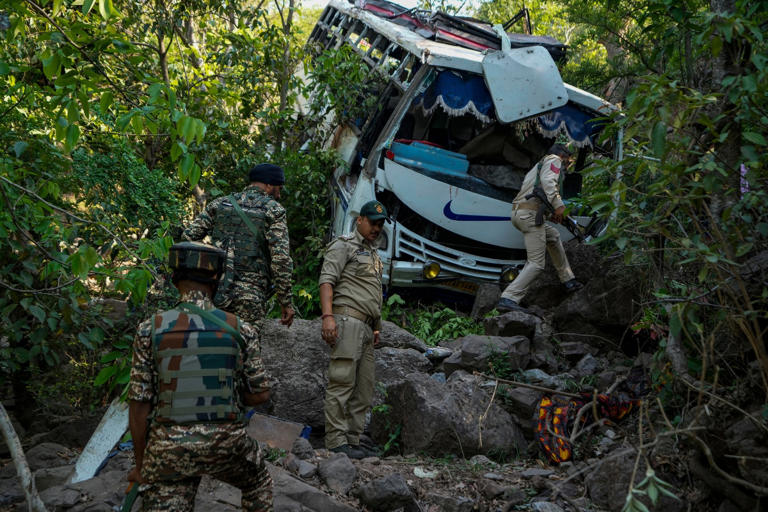A wave of violence hit JamShifting Frontlines of Terrorismmu and Kashmir from June 9 to 12, with four terrorist attacks sparking renewed security concerns. The deadliest attack targeted a bus of Hindu pilgrims in Reasi district, killing nine and injuring many more.
By Ajaz Rashid
Amid a surge in terrorist activity, Jammu and Kashmir witnessed a series of violent incidents between June 9 and 12, culminating in multiple attacks that have heightened security concerns across the region. The most devastating occurred in Reasi district, where terrorists targeted a bus of Hindu pilgrims, resulting in nine deaths and 33 injuries. As the central government intensifies its anti-terrorism efforts following the revocation of the region’s special status, these attacks signify a troubling shift of terrorist focus from Kashmir to the previously tranquil Jammu region, escalating fears and prompting high-level security reviews.
Jammu and Kashmir experienced a turbulent week with a series of violent incidents. Between June 9 and 12, the Jammu region was hit by four terrorist attacks, three of which occurred within a single day.
The terror attack began on June 9 in Reasi district when terrorists targeted a bus carrying Hindu pilgrims to the Vaishno Devi shrine. The bus driver lost control, causing the vehicle to fall into a gorge. This attack, which happened around 6:15 p.m., resulted in nine deaths and 33 injuries, coinciding with Prime Minister Narendra Modi’s third-term swearing-in ceremony.
Likewise, terror attacks on June 11 and 12, including a gunfight in Kathua near the India-Pakistan border, where two terrorists and a Central Reserve Police Force officer were killed. Additional attacks on checkpoints in Gandoh and Chattergala in Doda district left seven security personnel injured. On June 17, on the eve of Eid, a terrorist was killed in Bandipora. Similarly, in Hadipora, Sopore, Baramulla, two terrorists, including an IED expert named Usman, both Pakistani nationals, were killed in an encounter.
These incidents have heightened security concerns in Jammu and Kashmir in general and India in particular. Since the revocation of Jammu and Kashmir’s special status in August 2019, the central government intensified its anti-terrorism efforts, prompting terrorists to shift their operations from Kashmir to Jammu, a region that had seen relative calm for about 15 years. The first signs of this shift appeared in 2021, with the discovery of sticky bombs in Samba and drone attacks on the Jammu Air Force station.

Since early 2021, there have been 29 terrorist incidents in Jammu, with civilian casualties rising from 12 in 2023 to 17 in the first half of 2024. A report from the Indian Express highlighted that while Kashmir experiences more frequent terrorist incidents, those in Jammu tend to be more damaging.
The recent surge in terror attacks in Jammu and Kashmir has reignited concerns about regional security dynamics. A.S. Daulat, former Chief of India’s Research and Analysis Wing (RAW), offered a profound analysis in his interview with Karan Thapar, shedding light on the gravity of the situation.
Daulat stressed the seriousness of the attacks, remarking, “It’s a harsh revival from the other side (Pakistan). The government’s realization is evident as the Prime Minister himself chaired a meeting to review the security situation in Jammu and Kashmir.” His statement underscores the government’s proactive stance in addressing the escalating security challenges.
Following the Reasi terror attack, Prime Minister Narendra Modi and Union Home Minister Amit Shah expressed strong condemnation and reassured swift action against the perpetrators. Prime Minister Modi, in a conversation with Jammu and Kashmir Lieutenant Governor Manoj Sinha, directed continuous monitoring of the situation and emphasized the need for providing the best possible medical care to the injured.
In an official statement, the Office of LG J&K affirmed, “PM Shri Narendra Modi Ji took stock of the situation and has asked me to constantly monitor the situation. All those behind this heinous act will be punished soon.”
Union Home Minister Amit Shah echoed these sentiments, highlighting the urgent response from the local administration to ensure immediate medical assistance to the injured. “Those responsible for this attack on pilgrims will not be spared,” Shah asserted.
Reflecting on the evolving nature of terrorism in the region, Daulat pointed out, “This isn’t going to go away easily. Terror has become a nasty business again.” His observation contrasts recent discussions of normalcy with the stark reality of persistent security threats.
He emphasized, ‘The really bad attack took place at the Reasi, where nine people were killed in that bus. And they were pilgrims’. So I think, you know, quite often, there are these terrorist outfits that claim responsibility, but that is one attack, they wouldn’t like to claim responsibility for a nasty attack. civilians were killed, children were killed, and the bus rolled down into the river. It is nasty business. And yes, it has become it looks serious in Jammu. And I think government needs to take cognizance of it. Now the Prime Minister has said that we should use every security response possible.'”
Highlighting the scale of the current threat, Daulat echoed the concerns raised by the Director General of Police in Jammu and Kashmir, stating, “The figure of 70 to 80 terrorists is significant. Even in the early 90s, we used to talk about 200 to 220 terrorists across the state.” This comparison underscores the strategic shift in the composition and operational capabilities of terrorist groups.
DGP RR Swain further underscored the gravity of recent terror incidents, attributing them to a desperate bid by terror handlers across the border to sustain their operations following significant setbacks to terror infrastructure in Kashmir. Addressing a gathering at Hiranagar police station, he emphasized, “Recent terror attacks, including the tragic incident involving a pilgrim bus in Reasi, Kathua, and Doda districts, reflect the desperation of these terror handlers.”

He went on to assert, “They are like rats but they exist. They have guns and they are using these on innocent people,” reaffirming the resolve of security forces to eliminate such threats. “The days of terrorism are numbered in J&K,” he added, “but those who benefit from it will not give up easily.”
Addressing the operational challenges faced by security forces, Daulat noted, “Terrorists come in small batches, exploiting various routes and local support networks. It’s a challenge to track and apprehend them effectively.” His assessment underscores the complex dynamics of counterterrorism operations in the region’s rugged terrain.
Moreover, discussing Pakistan’s role, Daulat emphasized, “These attacks are coordinated from across the border. It’s a reminder of Pakistan’s strategic interests in the region.” His analysis underscores the geopolitical dimensions influencing the security landscape in Jammu and Kashmir.
In response to public concerns and demands for enhanced security measures, Daulat acknowledged, “There is palpable anxiety among the people. The government needs to restore confidence and ensure robust security measures.”
The recent bus attack in Reasi is particularly concerning as it suggests an expanding terrorist presence in Jammu and aims to provoke communal tensions, especially with the upcoming Amarnath Yatra and assembly elections. The pilgrimage, already challenging due to its harsh terrain and weather, now faces increased risks from potential terrorist attacks, reminiscent of previous assaults on pilgrims. For instance, the deadly 2017 attack on Amarnath Yatra pilgrims, where terrorists ambushed a bus and killed several devotees, highlighted the vulnerability of such gatherings to terrorist violence.
Similarly, the 2002 Amarnath pilgrim massacre, where terrorists attacked a Yatra camp in Pahalgam Anantnag district of Jammu and Kashmir, resulted in the tragic deaths of 30 pilgrims. Additionally, the 2002 Raghunath Temple attacks in Jammu targeted a place of worship, resulting in significant casualties and escalating communal tensions in the region.
Jammu and Kashmir Lieutenant Governor Manoj Sinha, after visiting the injured at the hospital, condemned the terrorist act as a deliberate attempt to disrupt peace in the region. Addressing reporters, Sinha vowed a strong response, stating, “Prime Minister Narendra Modi and Home Minister Amit Shah have been personally monitoring the situation. A joint operation is underway to apprehend the attackers, with our immediate priority being the recovery and well-being of the injured.”
Sinha also announced significant compensation for the victims’ families, including Rs 10 lakh for deceased victims and Rs 5 lakh for the injured, underscoring the administration’s commitment to supporting those affected by the tragic incident.
In response to the severity of the Reasi terror attack, the Union Ministry, following a comprehensive review of the security situation post-incident, transferred the case to the National Investigation Agency (NIA) for investigation into the killing of nine pilgrims. This decision came immediately after Union Home Minister Amit Shah chaired crucial meetings to assess security arrangements in the Union Territory in light of terror incidents and to prepare for the upcoming Amarnath Yatra this year.
In a major breakthrough, Jammu and Kashmir police on June 19th arrested a person allegedly associated with the June 9 Reasi terror attack, in which a bus carrying pilgrims was targeted, killing nine people. This is the first arrest in the case, marking a significant step forward for the security establishment. According to officials, the 45-year-old accused Hakim Din, a resident of Bandrahi in Rajouri district, provided logistical support to the terrorists who attacked a bus near Ransoo in Pouni tehsil. Senior police officers confirmed the arrest and noted that around 150 individuals have been detained in connection with the incident.

Leave a Reply